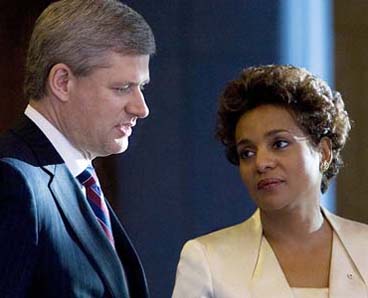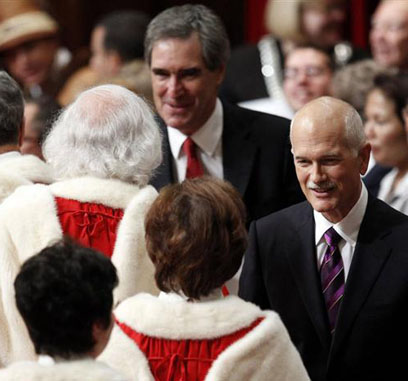Per capita party subsidy issue not as good for Cons as PM Harper thinks?
Jan 25th, 2011 | By Citizen X | Category: In Brief
Franz Kafka (1883—1924) was born and raised in Prague, in what is now the Czech Republic. He spent most of his short adult life working for an organization of the old Austrian empire known as Workers' Accident Insurance during the day, and writing a kind of wild anti-bureaucratic fiction at night. “Virtually unknown during his lifetime, the works of Kafka have since been recognized as symbolizing modern man's anxiety-ridden and grotesque alienation in an unintelligible, hostile, or indifferent world.” He died of tuberculosis just a month short of his 41st birthday.
Yesterday, in a piece headed “Harper’s talent for turning,” John Geddes at Macleans.ca opined: “Anyone can look good when they’re right. More formidable is the ability to look strong when events have proven you wrong.” This seems to me nicely written, but untrue. Or, at the very least, looking strong, like beauty, must be in the eye of the beholder.
In the current Canadian federal election campaign that is not officially happening (where is Franz Kafka when you need him?), a number of issues are surfacing about which Mr. Harper has been proven wrong. And you have to be a formidable Conservative partisan to imagine that he seriously looks strong in the middle of them.
On Thursday, January 13, 2011, eg, “Harper said the $2-per-vote subsidy, where parties ‘make no effort whatsoever to raise money is not acceptable to Canadian taxpayers … Our position on the direct public subsidy is well known. We don’t support it, we never have. We opposed its creation and have opposed it ever since … There are already generous credits and incentives in the tax system to encourage people to give to political parties today.’”
What Mr. Harper is hoping for seems easy enough to guess: “A plan to eliminate taxpayer subsidies of federal political parties in 2008 led to a revolt by all three opposition parties and an attempted coalition between the Liberals and NDP with the signed support of the Bloc Québécois to unseat Harper’s minority Conservative government.” This led to a prorogation of Parliament, to escape the will of the majority in the elected House – one of the dark blots on Mr. Harper’s copy book, that may or may not crush him in the end.

Governor General Michaelle Jean agrees to Prime Minister Stephen Harper's request to prorogue Parliament, Thursday, December 4, 2008. Photograph by: David Boily/Agence France-Presse.
But in the wake of the 2008 opposition “revolt” the Conservative polling numbers also briefly scaled previously (and subsequently) unheard-of heights of 44% and 46%. If only PM Harper can somehow re-enact this side of the political party subsidy issue, he will almost certainly win his majority of seats in Parliament at last.
However … time has passed, and various branches of we the Canadian people have apparently become somewhat older and wiser. The main stumbling block, it seems, lies not-so-buried in Mr. Harper’s own January 13, 2011 allusion to: “There are already generous credits and incentives in the tax system to encourage people to give to political parties today.” And this means the argument quickly becomes rather subtle and complex (even “Kafkaesque”?), rather than a simple winning case of “why do political parties need to be funded by taxpayer dollars anyway” – especially at a time of special concern with record public deficits, etc, etc, etc?
* * * *
If you want an aggressively exhaustive discussion on the per capita political party subsidy issue, consult “PM Harper should return multi-millions of dollars in per-vote subsidies, says NDP,” by Bea Vongdouangchanh, in yesterday’s Hill Times online.
 For a somewhat more concise but equally comprehensive technical report see Eric Grenier’s “Per-vote subsidy but a fraction of taxpayer support for political parties” in the Globe and Mail (which also includes a technicolour infographic with the alluring title “Parties at the public trough”).
For a somewhat more concise but equally comprehensive technical report see Eric Grenier’s “Per-vote subsidy but a fraction of taxpayer support for political parties” in the Globe and Mail (which also includes a technicolour infographic with the alluring title “Parties at the public trough”).
Having canvassed all the relevant numbers, Mr. Grenier ends with the plain enough conclusion: “Because of their strong fundraising organization and the large amount of money spent in the 2008 election, as well as the per-vote subsidy, the Conservatives benefited most from public funding in 2009, at $8.11 per vote.”

What present-day Canadian political party might reasonably want to sport these handsome ladies’ T-shirts during the 2011 federal election campaign – if and when such a thing ever officially happens, and leads to an actual election?
If you want to cut directly to the chase, just consider a short commentary by Bill Donahue of Edmonton in last Friday’s Edmonton Journal.” Mr. Donahue considers only the “$2-per-vote subsidy” plus additional “subsidies given political parties via political contribution tax credits.” He does not take account of a third category of “electoral expense reimbursements,” which Eric Grenier includes in his calculations. Yet even with his less than completely comprehensive numbers Mr. Donahue arrives at some intriguing conclusions:
“Relative to the number of votes received in the last election, the Bloc receives 33 per cent less of the total subsidies (tax credits plus direct $2 per vote) than they should … The Greens receive 18 per cent less, and the NDP and Liberals receive eight to nine per cent less. Only the Conservatives receive more public subsidies than their share, based on percentage of votes they received in the last election: 26 per cent more …Â Clearly this isn’t about what’s best for democracy or Canadians or whether parties that rely more on the $2-per-vote subsidy are ‘getting something for nothing’; it’s about promoting a policy that is still based on public subsidies and yet entirely to the strategic and monetary benefit of the federal Tories.” (Italics added.)
 Mmmm … If voters in Mr. Harper’s very Conservative-friendly home province of Alberta are already jumping to conclusions of this sort, what can we expect in the rest of the country?
Mmmm … If voters in Mr. Harper’s very Conservative-friendly home province of Alberta are already jumping to conclusions of this sort, what can we expect in the rest of the country?
Of course, maybe there are still Albertans who call Edmonton “Redmonton,” and dismiss the 35%+ of people in their province who did not vote Conservative in 2008 as altogether unimportant. But that’s still about the same percentage as Mr. Harper’s party is currently getting in the cross-Canada polls right now. And I at least cannot see at all how he still looks strong when the numbers do appear to be proving him wrong on the per capita political party subsidy issue.

Liberal leader Michael Ignatieff (top) and NDP leader Jack Layton (r) greet Supreme Court justices before David Johnston is sworn-in as Canada's 28th Governor General during a ceremony in the Senate chamber on Parliament Hill in Ottawa, October 1, 2010.
(Maybe it’s just because I haven’t got the right 3D glasses on, or something like that? In any event, it does make you wonder how many more issues like this just might be out there, once some kind of official election campaign gets officially rolling – if it ever does?)


Harper again is putting this into the spotlight for silly reasons saying that it isnt fair to Canadian tax payers. We need to keep the subsidy it is important to allow the people to have voice in how in a election is done when they vote but Harper would like to silence the Green party the NDP and the Bloc in the next election. Harper doesnt want to get rid of all taxpayer subsidies–just the subsidy per vote.